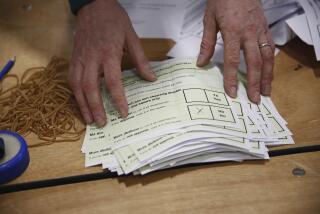Irish Vote in Critical Test of European Union Treaty
- Share via
LONDON — The citizens of Ireland voted Thursday on the Maastricht Treaty for European union, and officials of the republic late in the day expressed confidence that the referendum would receive a favorable vote.
Prime Minister Albert Reynolds said, “We do not envisage the treaty being rejected,” and he forecast a “yes” vote of 60% in the referendum. The ballots will be counted today.
Reynolds and the rest of the Irish leadership, who back the treaty calling for closer European political and economic ties, warned Irish voters on the eve of the referendum that a negative vote could cost them jobs and other benefits within the European Community.
Voters in Denmark rejected the treaty two weeks ago, causing turmoil in the EC Establishment because all 12 members of the European Community must ratify the accord for it to become effective. The agreement was hammered out in the Dutch city of Maastricht in December, after months of negotiations.
Ways are now being sought to overcome the Danish rejection, but a negative vote in Ireland, the second smallest member of the EC after Luxembourg, could doom plans for further integration of Europe.
The Irish media do not bother with exit polling, as developed in the United States and other countries, and therefore no accurate reading of Irish voters’ decision is available until the official count today.
Thursday’s voting took place on a Roman Catholic holiday, which some observers suggested might help the “no” vote because of country priests’ fears that the EC could force Ireland to accept abortion, now outlawed by its constitution.
On the other hand, according to political observers in Dublin, many working-class voters who might have voted against the treaty were watching two separate matches in the current European soccer championship and missed their chance to vote.
Almost all major groups--the political parties, the big labor unions, business, industry and farmers--had urged that Irish voters vote “yes “ in the referendum.
But in recent days, since the Danes rejected the treaty, several groups, including senior members of the Catholic church, have publicly or privately urged their followers to vote against the treaty.
More to Read
Sign up for Essential California
The most important California stories and recommendations in your inbox every morning.
You may occasionally receive promotional content from the Los Angeles Times.










